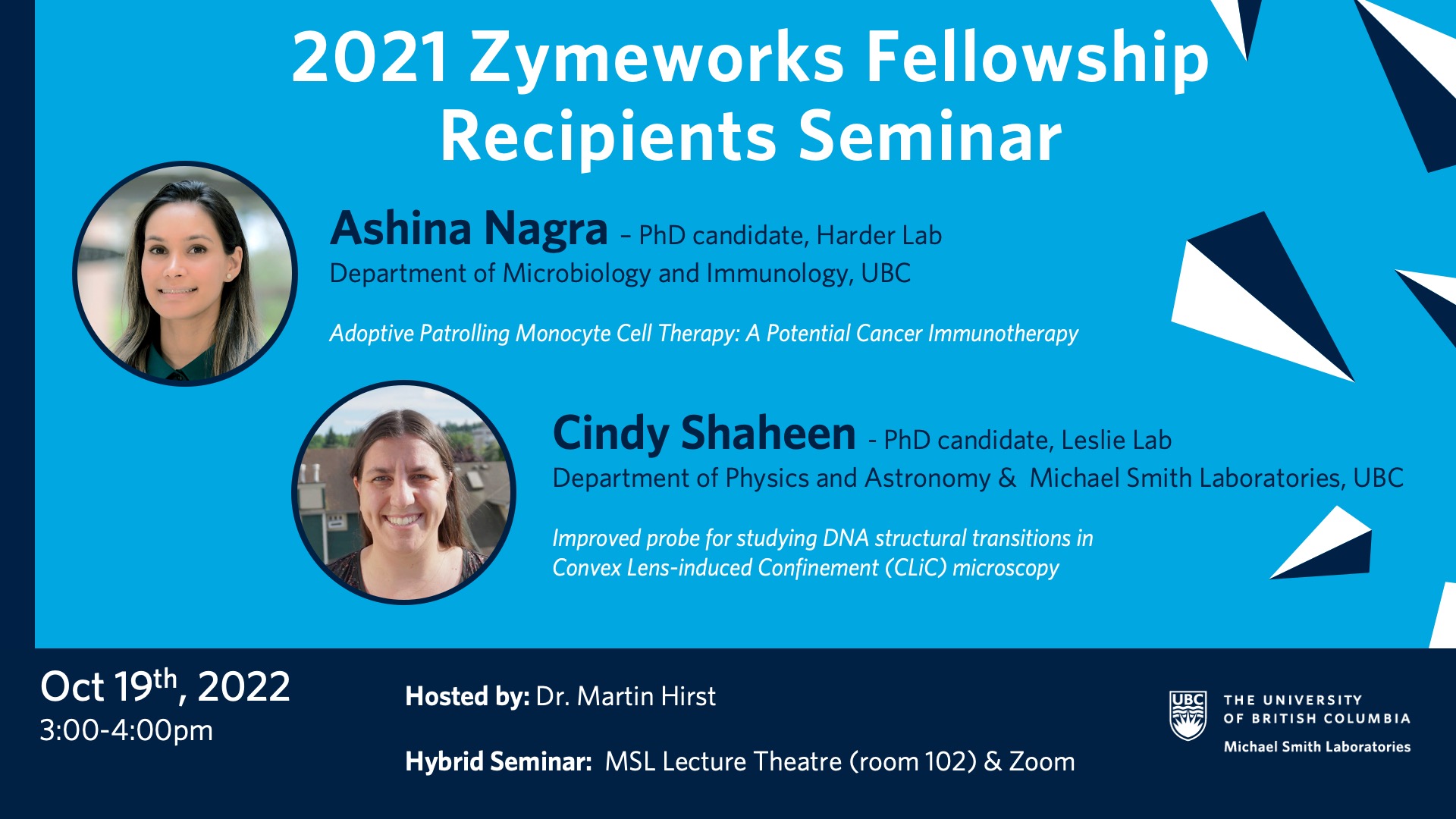
- This event has passed.
MSL Seminar Series: Zymeworks Fellowship Recipients seminar
October 19, 2022 @ 3:00 pm - 4:00 pm

Event details:
Date: Wednesday October 19th, 3:00-4:00pm
Host: Dr. Martin Hirst
This seminar will be presented in a hybrid format. All speakers will be delivering talks in person at the MSL Lecture Theatre (room 102). Audience members are welcome to attend either in person or via the zoom link. Those connecting via zoom will be able to ask questions during the Q&A portion using the chat function.
Zoom registration link:
https://ubc.zoom.us/meeting/register/u5cufu6hpzwrE9DveOstky2650ThoB51nYTC
Please join us at the beginning of the seminar for an award presentation for the new 2022 Zymeworks – Michael Smith Laboratories – Department of Microbiology and Immunology Fellowships in Advanced Protein Therapeutics recipients.
Speakers:
Ashina Nagra: PhD candidate, Harder lab – UBC Department of Microbiology and Immunology
Talk title: Adoptive Patrolling Monocyte Cell Therapy: A Potential Cancer Immunotherapy
Abstract:
Patrolling monocytes (pMos) are rare mononuclear phagocytes in the blood shown to prevent tumour metastasis to lungs. Our goal is to test the cancer immunotherapy potential of pMos generated using our developed in vitro culture system. Our preliminary research includes functional assays comparing the large numbers of pMos propagated in culture from bone marrow (BM) progenitors with their blood counterparts. We demonstrated that in vitro BM-derived pMos phagocytized murine breast cancer cells in an antibody-dependent manner. In vitro BM-derived pMos could also be transferred into hosts and homed to vascular organs for at least 2 days, corresponding to the 2-3 day half-life of pMos in vivo. Additionally, the transfer of pMos grown from CD45.1+ BM into pMos-deficient hosts led to significant antibody-mediated depletion of targeted cytotoxic T cells. This reveals that key pMos functions are preserved in culture, enabling us to harness them to treat disease. Adoptive pMos cell therapy studies in pre-clinical tumour models are underway to test pMos immunotherapy potential
Cindy Shaheen: PhD candidate, Leslie lab – Department of Physics and Astronomy and Michael Smith Laboratories, UBC
Talk title: Improved probe for studying DNA structural transitions in Convex Lens-induced Confinement (CLiC) microscopy
Abstract: DNA is supercoiled inside of cells. This supercoiling drives local structural transitions that may have important impacts on cellular function. For example, supercoiling can cause AT-rich regions to melt at physiological conditions, allowing transcription factors or other proteins to bind to them and initiate processes such as gene transcription. In our lab, we use a single-molecule microscopy technique called Convex Lens-induced Confinement (CLiC) microscopy to study these DNA structures and associated molecular interactions. In previous work, we used a fluorescently labelled oligonucleotide probe that bound to a structure of interest as a method of measuring the dynamics of structural transitions. However, these probes are concentration limited due to the amount of fluorescence background they add to experiments. In this presentation, I will discuss our work in implementing a molecular beacon probe, which consists of a fluorophore and a quencher on opposite ends of an oligonucleotide, to bypass this limitation. I will discuss several probe designs and their impacts on interaction rates, and how the final probe design can improve our studies of DNA structural transitions.